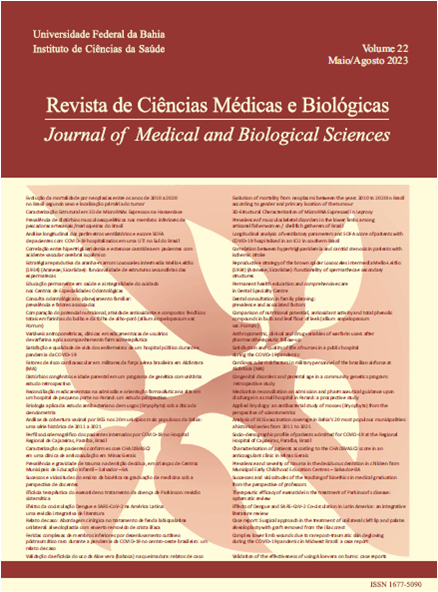Eficácia terapêutica do exenatide no tratamento da doença de Parkinson
revisão sistemática
DOI:
https://doi.org/10.9771/cmbio.v22i2.52661Keywords:
Doença de Parkinson, Exenatide, Peptídeo Semelhante ao Glucagon 1, NeuroproteçãoAbstract
Parkinson's disease is one of the most diagnosed neurodegenerative diseases in the world and is identified as a progressive condition of the Central Nervous System. The resulting dopamine deficiency triggers dysfunction and death of dopaminergic neurons in the nigrostriatal pathway, responsible for motor control. A new compound called exenatide, transmitted to the peptide hormone glucagon 1 (GLP-1), showed satisfactory reactions for the treatment of PD through randomized clinical trials. The objective of this research was to carry out a systematic literature review of randomized studies and their respective clinical trials on pharmacotherapeutic actions of the compound exenatide to point out the effects of treatments administered to patients. Searches were carried out in the PubMed, MEDLINE, ProQuest, Cochrane and Scholar Google databases, from August 2022 to September 2022, for studies published between the years 2013 to 2022, in English, Portuguese and Spanish. A total of 1,521 articles were found, and 4 studies were used for the analysis. The satisfactory results that all patients participating in the groups treated with the exenatide compound showed an improvement in the estimates of motor functions compared to the controlled groups. Quantification of specific proteins involved in brain insulin signaling and activity showed a greater amount of important biomarkers for the insulin signaling cascade compared to participants using placebo. The importance of carrying out further studies with the aim of verifying the degree of effectiveness of the compound in improving motor behavior and consequently in neuroprotection.
Downloads
Downloads
Published
How to Cite
Issue
Section
License
Copyright (c) 2023 Journal of Medical and Biological Sciences

This work is licensed under a Creative Commons Attribution 4.0 International License.
The Journal of Medical and Biological Sciences reserves all copyrights of published works, including translations, allowing, however, their subsequent reproduction as transcription, with proper citation of source, through the Creative Commons license. The periodical has free and free access.


